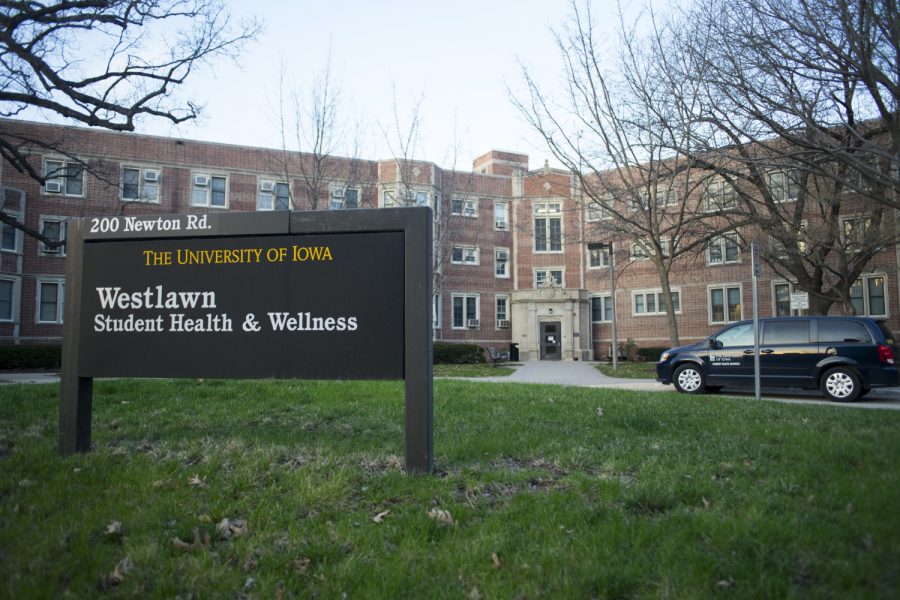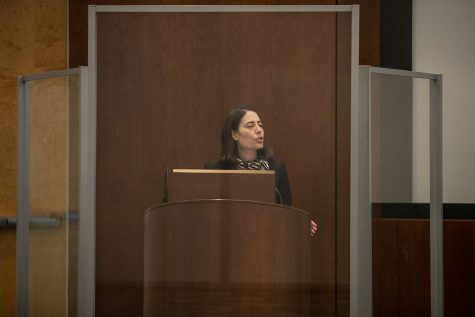University of Iowa administrators explore plans to establish a new student Well-Being Center
If approved, the project would allow for the construction of a new student well-being center to rehouse and consolidate the services currently offered at Westlawn Hall.
The Westlawn student health and wellness building is seen on Wednesday, Apr. 17, 2019.
April 12, 2021
Students may eventually see a new Well-Being Center on campus that would cohesively combine various student health services into one building.
The Division of Student Life, in partnership with Undergraduate Student Government and Graduate and Professional Student Government, recently announced preliminary plans for the project that would construct the center, which is to be entirely funded by a new student activity fee. The dollar amount for the added fee won’t be determined until construction plans and a final price tag is finalized.
The push for a new Well-Being Center is a response to a recent National College Health Assessment Survey, which collects data on student health interests and behaviors each year. The data highlighted recent declines in students’ physical and mental health. Administrators have also cited the deteriorating conditions of Westlawn Hall, where the current Student Health Center is located.
There are multiple potential designs for constructing a new Well-Being Center, with potential budgets for the project dependent on the size, location, and features of the new facility.
The idea for the project was originally pitched by students and health professionals within the Division of Student Life and must first be approved by the UI President’s Cabinet before a specific design plan or budget is set for the project.
Vice President for Student Life Sarah Hansen said the project presents the opportunity to redefine the meaning of wellness on campus and to promote healthy lifestyles in all areas of life besides just the physical.
“We have a challenge and an opportunity,” Hansen said. “The challenge is to rehome some of those health services, and the opportunity is to go beyond just that. And to me that is about creating a culture where, everywhere that students turn, they’re getting messages around the importance of well-being.”
Director of Campus Planning Joseph Bilotta said the UI’s student health program is also playing catch-up with student health programs that exist at other Big Ten institutions. The age and condition of current facilities in Westlawn Hall are major contributing factors.
In February, the UI proposed demolishing Westlawn hall to the state Board of Regents.
“Right now, our facilities rank toward the bottom of our peers,” Bilotta said. “The project creates a 21st century building comparable to those supporting programs at other Big Ten institutions.”
Once the project concept is approved by student government and university leadership, Bilotta said it will be presented to the regents. If approved, design plans of the facility will be considered shortly after.
Building design will be coordinated with students and university health professionals and later reviewed and approved by the UI shared governance system before being sent back to the regents for final approval, Bilotta said.
The involvement of shared governance in approving the design plans will allow student organizations, such as USG and GPSG, to provide input on the budget of the project and the associated yearly student activity fee that would fund it.
GPSG President Mackenzie Graham said, while she was originally unsure about supporting the initiative, COVID-19 highlighted the need for a modernized Well-Being Center.
“The cost was definitely a concern,” Graham said. “At the same point, COVID kind of put in perspective the need for more [health] services, and also better and more accessible services.”
A recent survey organized by GPSG also highlighted an increase in mental health issues experienced by students at the UI. As previously reported by The Daily Iowan,90 percent of graduate students reported a decrease in their mental well-being.
Graham said the results of the survey have further strengthened her support for the creation of a new Well-Being Center.
Outgoing USG President Connor Wooff said he thinks the student benefits of constructing a new Well-Being Center outweigh the costs.
“I think it needs to be done on our campus, and it would benefit students greatly,” Wooff said.
UI Senior Vice President of Finance & Operations Rod Lehnertz wrote in an email to the DI that because the current design plans include no state appropriations, student input is an essential piece in determining how to move forward.
“Any major project has notable costs associated with it, and in covering those new costs via student fees, impact on every student, for years to come, must be considered,” Lehnertz wrote. “The benefits created by the project, and the programs associated with the project, need to outweigh the added fee for UI students.”




















